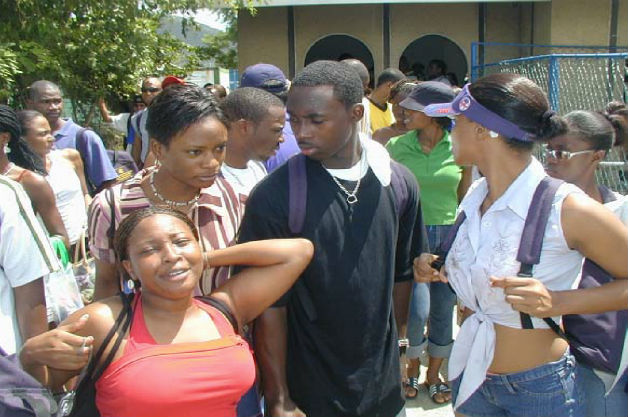“All hope is not lost. IGOs, NGOs and govts must collaborate”
July 19th, 2012 Young people face mounting problems due to rapid urbanization, economic shocks which result in rising poverty and unemployment, and the failure of many countries to modernize education, writes Tamica Parchment, 24, a Commonwealth Correspondent from Kingston, Jamaica.
Young people face mounting problems due to rapid urbanization, economic shocks which result in rising poverty and unemployment, and the failure of many countries to modernize education, writes Tamica Parchment, 24, a Commonwealth Correspondent from Kingston, Jamaica.
Evolution is a natural phenomenon that is seen in every aspect of life. Everything must change to adapt to its environment to ensure survival.
Our society should also change at an appropriate pace to growing needs. However many countries – especially the poorest – have a problem with adapting quickly to the growing needs of the youth population.
External difficulties that are influenced by governments and internal troubles related to mental health and physical well-being have become more intense as time goes on. These problems have left young people exposed in an atmosphere that in many ways has remained stagnant in the face of social change.
Young people face mounting problems due to rapid urbanization, economic shocks which result in rising poverty and unemployment, and the failure of many countries to modernize education to suit the needs of young people in the 21st century. For example, according to UNICEF’s report Children in the Urban World , one of the main problems being faced by the youth due to economic hardships and rapid urbanization is a heightened exposure to crime: “Urban gangs made up entirely… of young people are known for committing such crimes as extortion, petty theft, stealing or trafficking drugs…”
I have seen this in my own country where economic instability has led to a rising number of young people being exposed to, as well as involved in, criminal activity. There has also been a widening of the gap when it comes to access to healthy food and safe places to live. All of these issues should be monitored by governments who should respond quickly to prevent a further breakdown in conditions.
Young people are also faced with rising emotional instability due to the aforementioned external factors. UNICEF claims in its Adolescence, An Age of Opportunity report that “The prevalence of mental disorders among adolescents has increased in the past 20–30 years; the increase is attributed to disrupted family structures, growing youth unemployment and families’ unrealistic educational and vocational aspirations for their children.”
There has also been a notable increase in antisocial behaviour and emotional isolation in developed countries’ young people. This rise in psychological disorders is often attributed to information overload, the saturation of technology in young people’s daily lives and increased pressure being experienced due to uncertainty with regards to financial and personal security. .
All hope is not lost. IGOs, NGOs and governments must collaborate to create programmes that can reform our societies and correct the imbalance that has developed. Our governments need to re-evaluate the importance of youth, and how they must change their approach to ensure stability and growth. It is also time for schools and families to create new strategies and play a role in creating safe environments for young people and children to flourish.
The solutions exist. However solutions need planning, determination and commitment to be realized. Some cases of evolution are natural, but some must be forced in order to maintain balance. Our leaders have the choice to evolve their approach to changing social ills, or be stagnant in the face of moving waters. Our future and the overall stability of our societies depend on their choice.
…………………………………………………………………………………………………………………
About me:
“I’m a television editor/producer and business communications specialist. I have a first degree in media and communications and international relations. I enjoy classic literature, art, studying languages and reading about foreign policy and other political issues.
“I have two goals I would like to achieve in my lifetime: to travel to many places around the world and to make an impact through media by encouraging behavioural change.”
…………………………………………………………………………………………………………………
Opinions expressed in this article are those of the author and do not necessarily represent the views of the Commonwealth Youth Programme. Articles are published in a spirit of dialogue, respect and understanding. If you disagree, why not submit a response?
To learn more about becoming a Commonwealth Correspondent please visit: http://www.yourcommonwealth.org/submit-articles/commonwealthcorrespondents/




